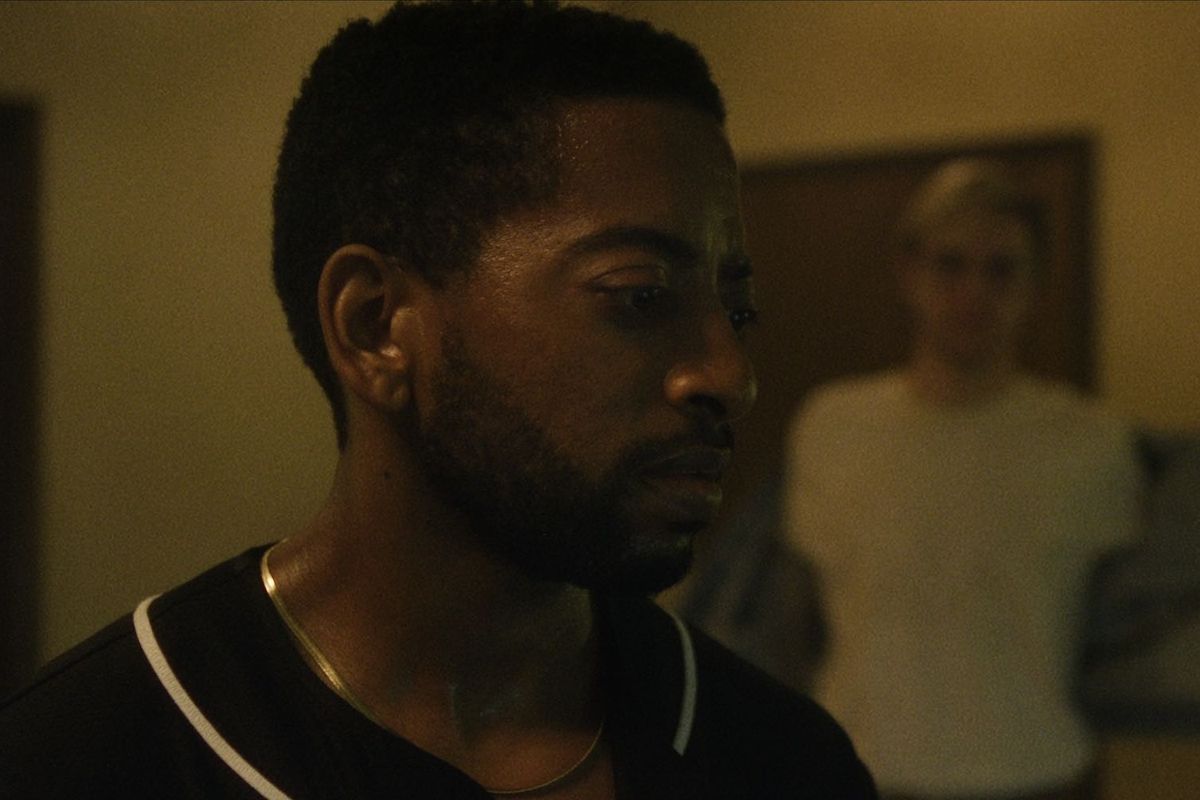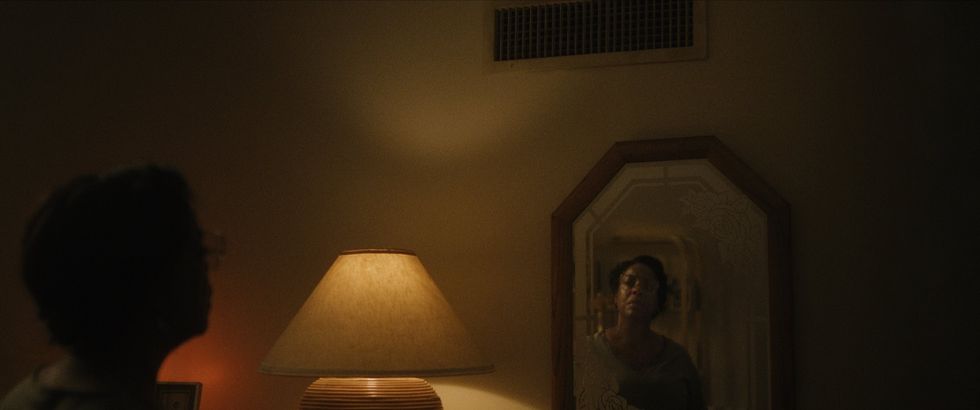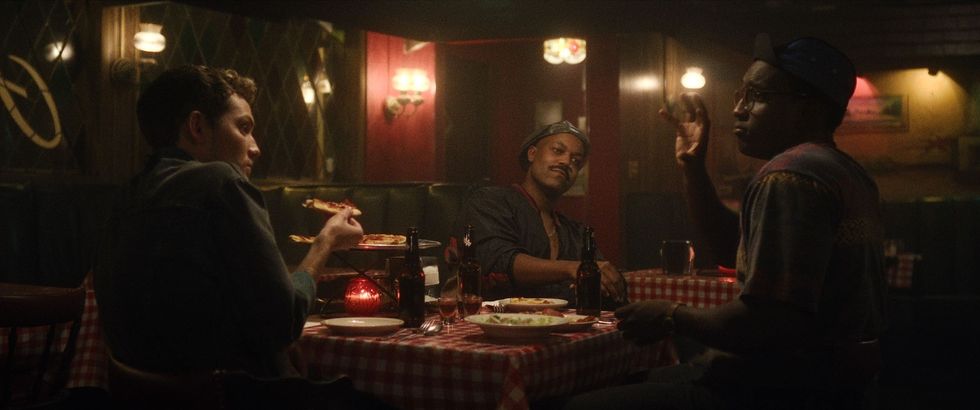
What Does Netflix’s ‘Dahmer’ Get Right About His Black Victims? Not Much
Photo courtesy of Netflix
To continue reading
Create a free account or sign in to unlock more free articles.
By continuing, you agree to the Terms of Service and acknowledge our Privacy Policy
Register
The content is free, but you must be subscribed to Okayplayer to continue reading.
THANK YOU FOR SUBSCRIBING
Join our newsletter family to stay tapped into the latest in Hip Hop culture!
Login
To continue reading login to your account.
Forgot your password?
Please enter the email address you use for your account so we can send you a link to reset your password:

Whether or not Dahmer — Monster: The Jeffrey Dahmer Story, the second-biggest English show in Netflix history, is exploitative is a futile debate. As a 10-hour fictionalization of the life of Jeffrey Dahmer, the notorious serial killer, necrophiliac, and cannibal who murdered 17 young men over the course of a decade and a half, Dahmer inherently values commercial success over genuinely respecting his victims and their families.
Dahmer enters the public consciousness in the midst of the rapid rise of true crime media. Documentaries, podcasts, miniseries, fan fiction, and a plethora of other forms of media have been inundated with new content that centers the atrocities committed by gruesome criminals. In fact, Dahmer is not the first instance in which Emmy-winning producer Ryan Murphy has tried his hand at true crime. The first two installments of his American Crime Story anthology series covered the assassination of Gianni Versace, and the infamous O.J. Simpson trial.
When contextualized in the current media landscape and Murphy’s own oeuvre, Dahmer is rendered inherently exploitative. Perhaps a more interesting question would be whether or not Dahmer is able to give a voice to Dahmer’s Black victims in spite of the series’ self-serving nature. The answer? Not quite. Most of Dahmer’s victims were young, queer Black men; the prolificity of his crimes was bolstered by his deliberate targeting of an oft-neglected and underserved community. Despite Murphy’s rule that the show “would never be told from Dahmer’s point of view,” myriad questionable editing and writing choices routinely undercut any attempt to center the stories and feelings of the victims and their families in a respectful manner.
From the very beginning, this is an issue, with the series beginning with Dahmer's arrest as a result of his last victim, Tracy Edwards (portrayed by Shaun J. Brown), being able to escape and flag down police. In using Dahmer's end to set up the start of the show, there isn't much space offered to how this incident affected Edwards for the rest of his life, so much so that Edwards' lawyer has said that "He could never get his life together again" after what he experienced.

Evan Peters and Niecy Nash, two award-winning actors who have previously worked with Murphy, headline Dahmer. Peters portrays the series’ titular character, while Nash portrays a version of Glenda Cleveland, one of Dahmer’s real-life neighbors. Nash turns in a characteristically nuanced performance that balances the complexities of concern, helplessness, defiance, and blistering hate with expert precision. As an actress, Nash uses the full breadth of her ability to color Cleveland, but it’s an inaccurate representation of the real-life woman who was instrumental in putting a stop to Dahmer’s vile crimes. The Glenda Cleveland of Dahmer is a composite character: a consolidation of experiences that primarily belong to the real-life Cleveland, who lived in an adjacent apartment building and not in the apartment next door as the series suggests, and Pamela Bass, the true next door neighbor who Dahmer offered a sandwich of human flesh to.
By combining Cleveland and Bass, two Black women with separate and vital experiences related to the Dahmer years, into one character, Dahmer minimizes Black voices when it doesn’t need to. In fact, portraying both Bass and Cleveland onscreen would have only given more credence to the series’ shaky characterization of Milwaukee’s inefficient police force. Obviously, the two women were not killed by Dahmer, but they are both to a certain extent, victims of his. From the putrid smells of acid and decaying human flesh wafting through air vents to sounds of power tools and decapitation echoing in the night, Dahmer terrorized Bass and Cleveland, too. There was more than enough space in the series to do justice to the individual stories of both of those women.
“Silenced,” Dahmer’s sixth episode, has garnered widespread acclaim since the series debuted. It’s an unquestionably stunning episode from the tender performances of Peters and Rodney Burford, who portrays Anthony “Tony” Hughes, a deaf Black gay man. This episode, which centers on the life and story of Hughes, is the only time where the series truly gives Dahmer’s victims its undivided attention. Nonetheless, what could have been a truly pivotal moment for a fictional series in the current true crime wave ultimately falls flat, because of the way the episode’s writing romanticizes Dahmer and Hughes’ relationship.
Written by David McMillan and Janet Mock, “Silenced” manipulates the pair’s relationship to add further nuance to Dahmer’s separation anxiety and emotional immaturity. As Dahmer tells it, the serial killer first met Hughes at a gay bar in 1991, and continued to court him before eventually murdering him. Dahmer’s own confession states that he had not met Hughes before the night he was murdered. However, some friends of Hughes have alleged that Dahmer knew of Hughes, and made a point of looking for him for almost two years before the murder. In an October interview with The Guardian, Hughes’ mother noted that the events leading up to her son’s murder “didn’t happen like that.” “I don’t see how they can use our names and put stuff out like that out there,” she added. Netflix was not required to consult the victims’ families because the show portrays events that are a matter of record. Still, the flippancy with which Netflix and the Dahmer team handled communication with the real-life people whom Dahmer terrorized is nothing short of disgusting.

Turning Hughes’ lived experience into a love story does more to humanize and romanticize Dahmer, than it does respectfully center Hughes in his own narrative. Audiences get to see Hughes as a beloved brother, son, and soon-to-be uncle that relentlessly chases his aspirations of being a model. Unfortunately, Dahmer can’t help but undercut itself by falling into a lane of sensationalization that usurps Hughes as a subject, and instead casts him as a tool audiences can use to understand — and even justify — Dahmer’s heinous actions. A series that butchers its sole in-depth retelling of the life and story of one of his victims is not a series that is invested in truly giving a voice to the real-life Black people that he targeted and terrorized.
In addition to “Silenced,” Dahmer’s final episode has likewise become one of the series’ most hotly-contested installments. Directed by Paris Barclay, “God of Forgiveness, God of Vengeance” features word-for-word recreations of testimonies from the families of Dahmer’s victims. In the wake of the series’ premiere, several viral tweets featuring side-by-side comparisons of Dahmer scenes and real courtroom footage dominated the trending topics list on Twitter. In a September 22 tweet, Eric Perry, cousin of Errol Lindsey (one of Dahmer’s victims), wrote, “If you’re actually curious about the victims, my family (the Isbell’s) are pissed about this show. It’s retraumatizing over and over again, and for what?”
\u201cI\u2019m not telling anyone what to watch, I know true crime media is huge rn, but if you\u2019re actually curious about the victims, my family (the Isbell\u2019s) are pissed about this show. It\u2019s retraumatizing over and over again, and for what? How many movies/shows/documentaries do we need?\u201d— eric. (@eric.) 1663866674
“Recreating my cousin having an emotional breakdown in court in the face of the man who tortured and murdered her brother is WILD,” he added.
Perry is absolutely right. Centering Dahmer’s victims and their families means allowing them to tell their stories — or not tell them at all — on their own terms. DaShawn Barnes, who portrayed Rita Isbell’s emotional breakdown in court, gives the performance her all, but the scene cannot escape how exploitative it is. Black pain and grief are treated as entertainment fodder above all else.
For every moment that Dahmer attempts to spotlight the overlooked Black people that are integral to his story, those at the helm of the series continuously made choices that counteract how effective those attempts could have been. The end result is a series that fails to respectfully hold space for Dahmer’s victims and their families, and misconstrues some of their story in the process.
—
Kyle Denis is a journalist, songwriter, singer, actor, and creative. He loves to cook, listen to music, and just soak in the world. Read more of his work here.